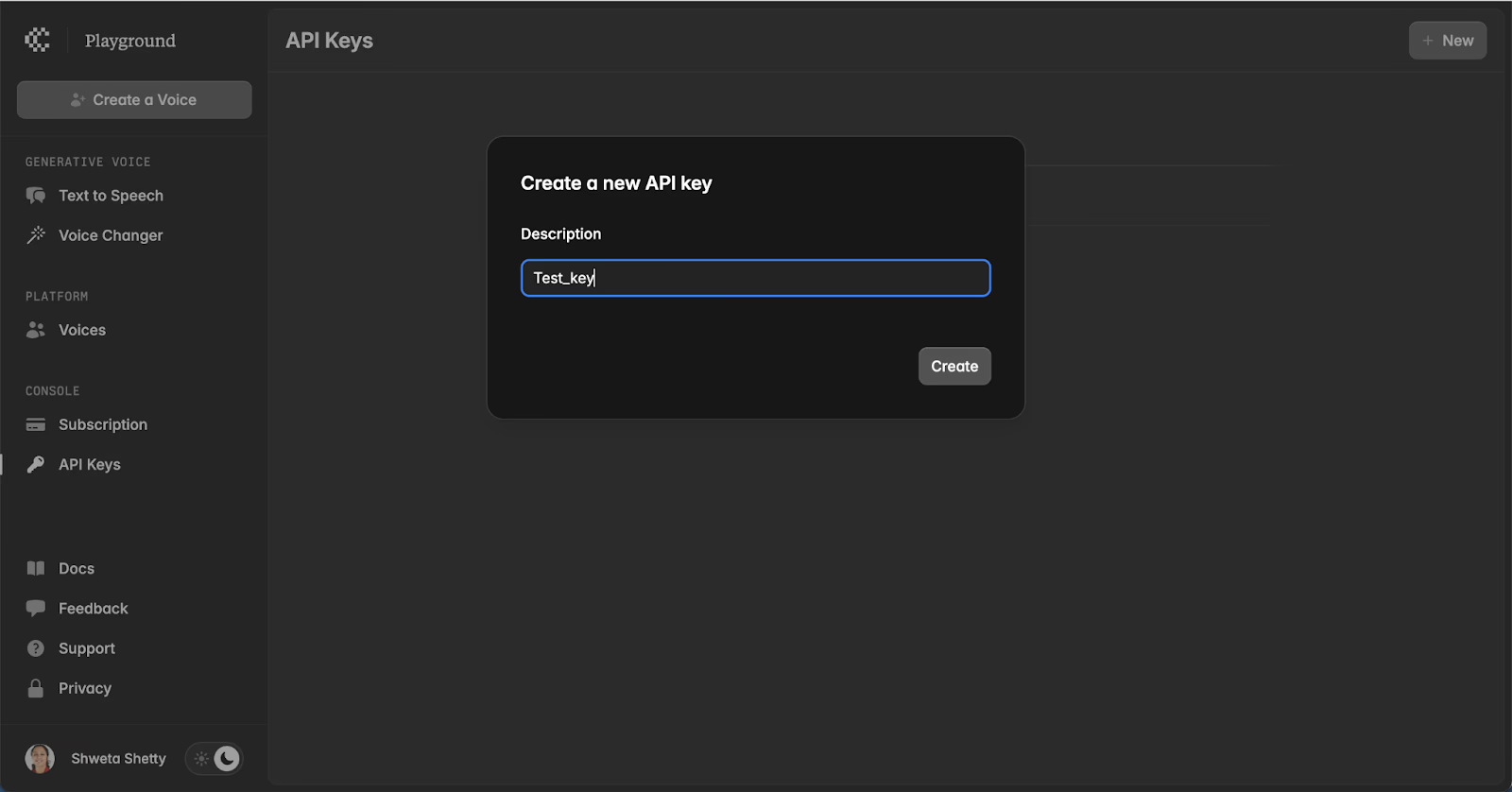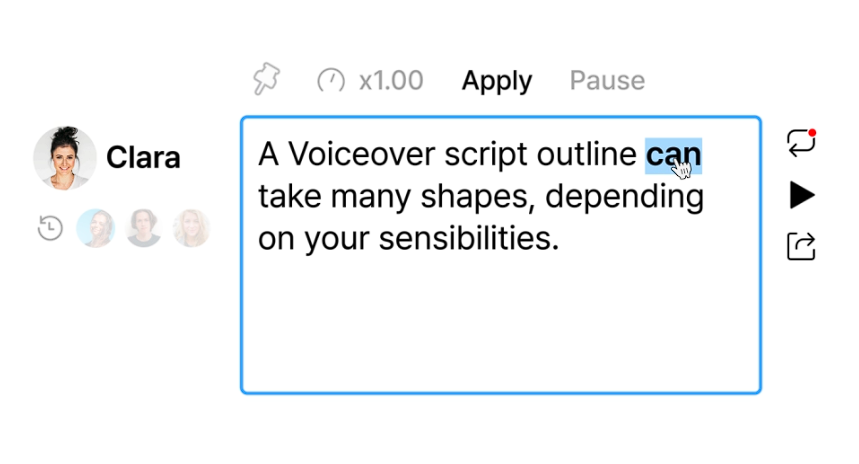All Posts
13+ Best AI Voice APIs for Text to Speech [2025]


Text-to-speech (TTS) technology has been around for decades, but has evolved dramatically in recent years. Services can now not only offer more realistic speech, but even fully-generate AI videos once a user enters text into a textbox.
Thanks to AI voice APIs, more and more apps and platforms are able to access these incredible capabilities without having to create their own text-to-speech technology. Developers can incorporate these services to quickly and seamlessly get the benefits of TTS to their end-users.
Users who want to synthesize human-like speech likely need an AI Voice. These generate spoken word from a combination of media sources including audio or video samples, like a person speaking, and a body of text, like a manuscript. Many AI voice software packages offer front-end user interfaces for simple and direct sample outputs.
Using an API for AI voice means developers can add these capabilities to their apps in minutes–without any coding required.
A few of the applications that rely on AI Voice technology include:
Text-to-speech or TTS refers to the specific process of entering text and pre-recorded sounds to form synthesized speech. It most commonly uses pre-recorded vocal sounds from a narrator to form spoken words. Enter characters into a text-to-speech API and it will read it back aloud. Although they’re always changing and improving, good examples include voices that have been around for a long time, like Apple’s Siri or Amazon’s Alexa.
In traditional text-to-speech, a voice actor records a library of neutral vocal sounds that are stored in a database and associated with a dictionary spanning every necessary combination of inflections to form clear words.
Here, software outputs semi-realistic, but monotone speech. The sound of the spoken word is limited to those in the voice recordings. They are often bundled with operating systems for accessibility.
Text-to-speech Features
With the development of machine-learning, AI algorithms allow for more realistic speech. Using a database or small sample, AI can apply inflections and smoother transitions between words and sounds for more natural-sounding pronunciations.
As a result, most text-to-speech services are evolving to utilize AI voice APIs. AI has also evolved the text-to-speech process so that responses can be generated automatically in real time. Services like AI chatbots or even Siri and Alexa use real-time responses where text is generated through algorithms rather than being typed out manually in advance. As a result, almost any synthesized voice today can be referred to as an AI voice.
AI voice generators allow for highly-customizable output. AI algorithms can now perform multiple tasks in the voice-production process to create unique spoken words faster than ever, and with less recording time. Rather than a full database of vocal sounds, techniques like voice cloning make it possible to compile a synthesized voice from a small sample.
AI voice generators can take an individual sample, uploaded by a user, and synthesize a personalized AI voice. Using machine-learning, these generators are able to map speech patterns to create a lifelike voice.
AI Voice Generator Features
There are plenty of reliable options for developers looking to quickly integrate AI Voice into their services. Some services offer more nuanced control and others offer more advanced features. Read on to see which APIs provide the maximum value.

Tavus gives developers the Conversational Video Interface (CVI)—an API for real-time, face-to-face AI humans that see, hear, and respond like a person—alongside endpoints for speech and video generation. You can convert text to lifelike speech, or go beyond audio with photorealistic video where the AI human interacts naturally in real time.
Under the hood, Tavus is powered by purpose-built human simulation models. Phoenix‑3 delivers studio‑grade, full‑face rendering with pixel‑perfect lip sync and real emotional nuance. Raven‑0 adds perception and ambient awareness, interpreting visual context and body language. Sparrow‑0 handles intelligent turn‑taking so conversations feel fluid and human.
Train a personal digital twin from a short two‑minute video, or start fast with professionally optimized stock options. Then embed Tavus to deliver real‑time, humanlike interactions inside your product—no heavy infrastructure required.
Tavus shines when quality and presence matter—like ecommerce experiences that need a helpful on‑page expert, or learning products that benefit from a perceptive, 1:1 coach.
Ecommerce developers can embed AI humans on product pages to engage users in real-time discussions about features and benefits.
Learning management system developers can enable personalized coaching videos with tailored feedback on metrics, milestones, and performance improvements.
Key features:
Create personalized media experiences that captivate audiences at scale.

Cartesia is a real-time, multimodal intelligence platform offering AI voice products and APIs like Voice Changer, Voice Cloning, and Text to Speech. Their text-to-speech API creates lifelike voices with accurate transcript following and fast response times.

Key features:

Amazon Polly is a text-to-speech API that allows you to transcribe text into different languages. Its primary use case is app development. It provides programmers the opportunity to incorporate features like speech-activation. It supports Java, Node.js, .NET, PHP, Python, Ruby, Go, C++, HTTP, Android and iOS.

Key features:

Descript is an AI service that is geared toward end-user media development, for work like podcasts and videos. Its text-to-speech tools focus primarily on narration. It includes speech editing like dubbed audio speech repair, voiceovers, and voice cloning.

Key features:

ElevenLabs is a text-to-speech service that hosts several options, including a database of thousands of pre-made voices spanning 28 languages. It focuses on providing real-time API services for developing chatbots, websites, and other SaaS.

Key features:

Google Cloud Speech is a text-to-speech API primarily designed to offer integration across app and hardware ecosystems. It uses Google’s DeepMind AI to generate near human speech. It allows you to use Speech Synthesis Markup Language or SSML to indicate pauses and inflections in the spoken output.

Use case: Voicebots in contact centersKey features:

IBM Watson is an AI suite that provides a cloud text-to-speech service. It’s designed for app development and commercial services, offering end-to-end encryption. It allows programmers to adjust specific speech qualities including strength, breathiness, and timbre.

Key features:

Listnr is an AI text-to-speech platform that acts as a centralizing API for text-to-speech voice services. It allows programmers to integrate access to multiple voice databases into one, including those from Amazon Polly, Google WaveNet, IBM Watson and Microsoft Azure.
Key features:

Lovo is an AI multimedia service that offers a text-to-speech and AI voice API. It features an online interface with tools designed to assist users in media creation in the form of video, photo, and text editing. Its text-to-speech service is designed for high-quality recordings.

Key features:

Microsoft Azure is a software development service designed for creating applications. It includes an AI Voice API known as AI Speech. Its text-to-speech functions are designed to create conversational interfaces with natural-sounding voices. It supports C#, C++, Go, Java, JavaScript, Objective-C, Python, and Swift programming languages.

Key features:

MurfAI is a text-to-speech service designed around content creation and software integration. It offers direct integrations with Canva, Google Slides, Adobe Audition, Adobe Captivate, and websites as HTML Embed Code. It also features a front-end application for Windows and incorporates with platforms that support Microsoft Speech API. It features a voice generator, voice cloning, voiceover language translation, and app development.

Key features:

Play.ht integrates several AI voice databases to form a wider range of voices across different languages. It combines voices from Amazon, Google, IBM, and Microsoft. Its AI voice API targets audio publishing, audiobooks, conversational AI, interactive voice response (IVR) systems like call-centers, and e-learning.
Its API includes International Phonetic Alphabet (IPA) symbology so users can customize pronunciations. It provides an audio widget to integrate with websites.

Key features:

With Android and iOS apps and browser extensions, Speechify applies text-to-speech to document-reading across devices. Its web interface called Studio allows users to perform voice-overs in 40+ languages and dubbing in 20+ languages. It also features a voice-cloning service that provides 100,000 characters per month and access to commercial usage rights.

Key features:
Now that we’ve reviewed the best providers, let’s address some frequently asked questions about AI voice APIs.
While there are many free text-to-speech products, most AI voice APIs are paid. Some AI voice APIs do offer a free trial or a demo. Tavus offers a free tier with API access to Conversational Video Interface, 25 conversational minutes per month, 5 minutes per month of video generation, and access to 25 stock options.
It’s a great way to explore the platform before committing. Personal replica training isn’t included on the free plan; pay‑as‑you‑go overages are available if you exceed included minutes. You can sign up for free here.
With the news around deepfakes, the legality of using an AI voice can be confusing. After all, there are many bad-faith actors that use AI for disinformation. Some AI voice services even specifically feature real individuals like celebrities.
In most instances, the attributed speaker is consenting, contracted, or most likely paid royalties for providing their voice. If you have doubts or concerns, it is best to check the service’s website for information on how they source voices.
Tavus is committed to safety and responsible use. The platform is built with privacy and security front-of-mind so developers can focus on user experience.
Consent mechanisms, identity safeguards, and clear disclosures help ensure only a user can clone their own likeness. Policies and guardrails are built to support safe, compliant, and on‑brand experiences across conversations.
Yes - in fact, some AI voice APIs are designed to do just that. While you can’t clone another person’s voice without their consent, you can always make an AI of your voice, and Tavus is a great place to start.
There are many AI voice API options to simplify a workflow, with each offering different features and advantages. Using an AI voice API can drastically boost project performance all while streamlining production. This removes the burden of building AI voice capabilities on your own, saving thousands of developer hours and allowing you to launch new capabilities in weeks or months.
The rapid development of AI has created a quickly-evolving toolkit for content development. With so many options, it can be hard to know where to start. On the cutting-edge of the industry, Tavus gives developers the tools to create the most realistic voice and video experiences out there. With CVI, Phoenix‑3 face rendering, Raven‑0 perception, and Sparrow‑0 turn‑taking work together in real time. You can train a personal digital twin from a short two‑minute video or use stock options to get started fast. Integration is straightforward with white‑labeled APIs and webhooks.
Enabling users to create high-quality audio and video recordings to scale has never been easier.